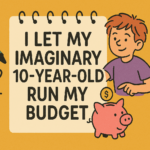It’s not about the money. It’s about compromise, control, and who remembers the milk…
There’s the budget.
And then there’s the relationship.
You sit down to talk about money—thinking you’re solving a financial problem.
But what you’re really doing is walking into a conversation about habits, power, memory, fairness, trust, and timing.
No spreadsheet can make room for all of that.
It’s NeverJust About the Numbers
Most people think budgeting together is about setting limits, tracking expenses, and building goals.
And yes, those things matter.
But that’s not where the tension is.
The tension is in who gets to decide what matters.
Whose spending is “normal.”
Who has to explain themselves.
And who forgets to log things, they just don’t get why it’s a big deal.
Control Doesn’t Always Look Like Control
One person often takes the lead with money.
They’re building the system.
And keeping track.
Remembering the due dates, the subscriptions, the grocery budget, the random gifts that blow the plan.
And sometimes, that person ends up holding more than just the numbers.
They carry the mental load.
They become the one who says “no.”
They make themselves responsible for keeping the whole thing together—even when it’s shared.
Are you that person?
Do you sometimes feel the resentment quietly building because you’re managing something that’s supposed to be equal?
The Little Things Aren’t Little
The funny thing is couple budgeting isn’t usually about the big decisions.
It’s about small, daily moments.
Someone forgets to add their coffee to the tracking app.
Someone pays the phone bill late, again.
Someone picks up groceries and misses half the list—but adds snacks.
And now you’re $22 over, wondering if it’s worth bringing up.
Again and again. Stress seeps in.
Are you really annoyed about the snacks?
Or is it about being the only one who remembers what day the electricity bill hits?
Compromise Isn’t Compromise when it isn’t Even
One person wants to tighten up spending.
The other doesn’t or worse won’t see the point.
One tracks every expense.
The other rolls their eyes at “budget categories.”
One sees flexibility.
The other sees carelessness.
It’s not about who’s right.
It’s about how much adjusting each person is doing.
And whether the effort feels seen—or taken for granted.
Who Remembers the Milk?
It’s such a simple question but it speaks volumes about your budget, more than your bank account ever will.
Because one of you will always notice when something’s running low.
When the meal plan is falling apart.
When the spending doesn’t add up.
Of course, it’s not just milk.
There’s a pretty big list of all the “other” things.
That kind of attention takes energy.
It’s rarely divided equally.
And it almost never shows up in the numbers.
So What Is the Hardest Part?
It’s not setting the budget.
It’s managing the invisible work that keeps the budget alive.
It’s talking about money without keeping score.
It’s having the same conversation for the fifth time and choosing not to turn it into a fight.
It’s finding a way to stay on the same side—even when your instincts are pulling in different directions.
Most couples figure out the money.
The harder part is learning how to handle each other in the process.
Note: This content is for entertainment purposes only and is not financial advice. Please consult a qualified financial advisor for guidance specific to your situation.








